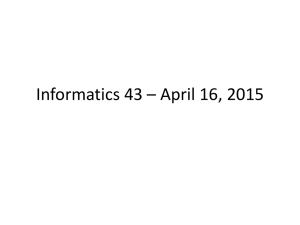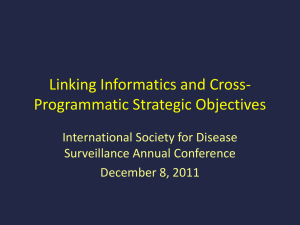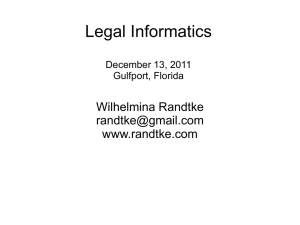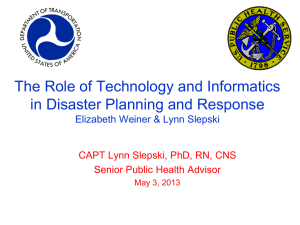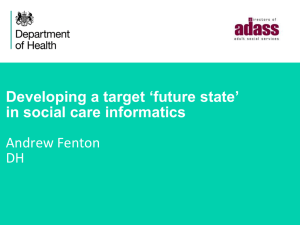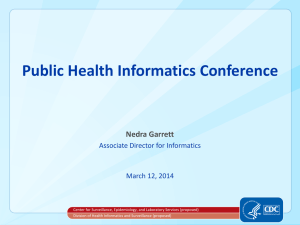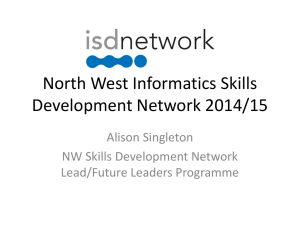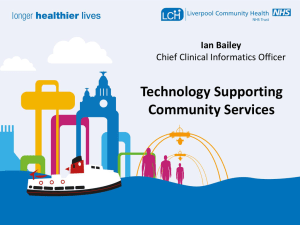INFORMATICS - USC Upstate: Faculty
advertisement
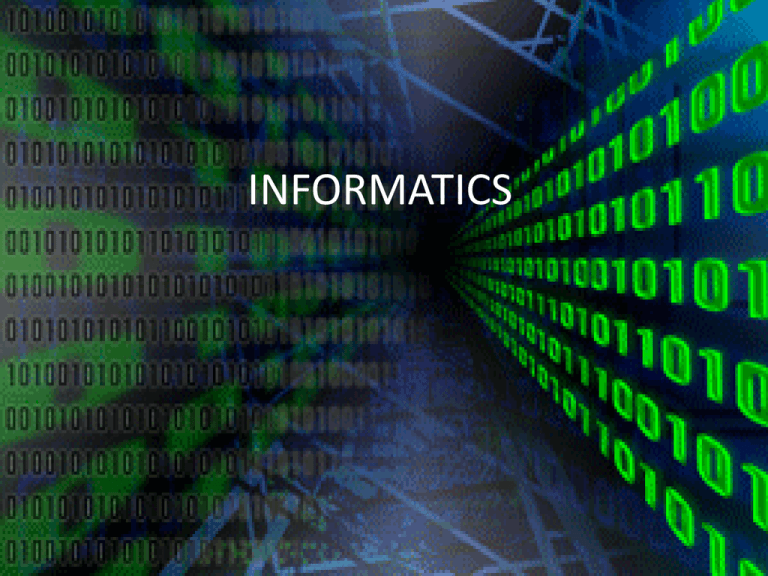
INFORMATICS What is Informatics? • the science of processing data for storage and retrieval • study of how information is collected, stored, manipulated, classified, organized, retrieved, visualized What is Informatics continued… • Both natural and artificial systems involve information can be examined within the framework of informatics, including the brain, computer systems, and paper filing methods. Concerned with… • • • • How data is collected and stored How it is organized How it is retrieved and transmitted. It can also include issues like data security, storage limitations, and so forth. Origin • New term adopted across Western Europe • Developed a meaning roughly translated by the English as ‘computer science’, or ‘computing science’. Origin Mikhailov • A Russian/Soviet Engineer • Information Scientist Alexander Mikhailov • Advocated the Russian term informatika (1966), and the English informatics (1967), as names for the theory of scientific information. • Said this discipline of science investigates the structures and properties of scientific information Informatics in the World Around Us Impact of Informatics in Health • Construct computer health information systems by studying the needs of doctors, nurses, patients, and health care organizations • Create health networks that allow doctors and nurses to share knowledge and best practices • Create new methods of information delivery that motivate patients to follow treatment recommendations Impact of Informatics in Science • Extend our understanding of the human genome • Develop computing applications that manage data from biotechnical and pharmaceutical collaborations • Manage and understand data collected to solve scientific challenges in the natural and social sciences Impact of Informatics Human Computer Interaction • Devise theories and methods to improve human interaction with computers • Design and develop computer interfaces that connect individuals and groups • Study human intelligence to create better machine intelligence Impact of Informatics involving interactive media and art • Create 2-D and 3-D animation and visualizations • Explore the best use of digital media to solve problems in education, health care and entertainment • Study and design the structure of information and its aesthetic presentation • Build simulation and virtual reality environments Impact of Informatics in business • Develop information tools to capture and analyze data to create better business intelligence • Design decision support systems to assist business leaders • Create software tools that automate warehouses and factories Impact of Informatics in Communities • Create information and communication technologies that bridge cultural gaps • Build geographic information systems that map our communities and help with urban planning • Use technology to promote government participation and voting Informatics as a Major Bachelor of Arts in Information Management and Systems (USC UPSTATE) • • • • • This degree has four major parts: General education The Information Technology/Informatics core The digital media and communications core Application area or minor Master of Science in Informatics (USC UPSTATE) • The Master of Science in Informatics program consists of at least 30 credit hours beyond the baccalaureate degree. This includes a minimum of eight required courses (24 credit hours) and six credit hours of thesis or independent study. Two tracks of study are available to students: Health Information Management (HIM): INFO 622: Advanced Knowledge Inference Systems INFO 650: Information Resource Management INFO 710: System Innovation INFO 720: Information ArchitectureINFO 760: IT Intellectual Property Protection INFO 761: Business and Competitive Intelligence INFO 762: Interoperability INFO 763: Advanced IT Project ManagementINFO 798: Independent Graduate Study in Informatics (1-6 hours) INFO 799: Thesis Preparation (1-6 hours) INFO 796: Special Topics in Graduate Informatics (1-6 hours Information Resource Management (IRM): NFO 622: Advanced Knowledge Inference Systems INFO 650: Information Resource Management INFO 710: System Innovation INFO 720: Information ArchitectureHIMS 750: Public Health Statistics HIMS 751: Healthcare IT Vendor Management HIMS 752: Compliance in the Healthcare Industry HIMS 753: Strategic Planning for Healthcare Information Management SystemsINFO 798: Independent Graduate Study in Informatics (1-6 hours) INFO 799: Thesis Preparation (1-6 hours) INFO 796: Special Topics in Graduate Informatics (1-6 hours) Student Learning Outcome Upon graduation from the Master of Science in Informatics program, students will be able to: • Envision and plan information management systems, solutions, structures and processes. • Insure legal and regulatory compliance. • Utilize information management resources to analyze and transform information into a knowledge-creating competitive advantage for businesses or organizations. The Informatics major will give you valuable skills that can be transported to a number of job settings: • A technical understanding of how computing systems operate • Ability to adapt/assess and apply new trends in IT Welldeveloped problem-solving skills • Ability to work in teams, such as those formed for the senior capstone project • Well-developed communications skills to clearly convey solutions and observations to others. • An understanding of social and ethical principles as they relate to IT issues Job Outlook Common Job Titles • Account Manager • Applications Analyst • Applications Programmer • Circuit Designer • Computer Operator • Computer Support Service Rep •Database Analyst Expert •Software Engineer •Software Tester •Technician •Web Designer •Programmer •Media Specialist Possible Salaries Employment Areas • • • • • • Healthcare Government Academia Private Corporations Non-Profit Organizations Publicly Traded Corporations Career Description • Implementation of software systems – interact with customers – listen to programmers and other tech personnel – Assess and discuss designs – Adapt to changing requirements Health Informatics • Study of resources and methods used for management of health information • First used in dental data collection in 1950s • Quickly progressed to other medical fields http://searchhealthit.techtarget.com/definition/health-informatics Academic Informatics • Informatics used in the support of teaching and learning • Examples – VIP – Blackboard Informatics in the Entertainment Industry Iteractive media design, animation, development of Interactive Media in the digital game industry. In this specialization field you will have training as programmer or software engineer for the mediaand entertainment industry. You gain experience and methodological competence to solve major challenges on data handling, changing software standards and complexity. Informatics Applications: Game Developer, Developer of Content Management Systems,Developer of Web Content Management Systems, Developer of Social Network Systems, Developer of Kiosk Systems, Developer of City Information Systems, Developer of eLearning Systems Informatics There’s so much you can do involving this subject. Its pretty much everything around us, its just up to you to decide how to make it a part of your life. You don’t have to get a degree or get a job in the field. Its just knowing about the world you live in that matters the most. References • http://www.informatics.uci.edu/qa/#general01 • http://soic.iupui.edu/about/what-is-informatics/ • http://www.careers.uiowa.edu/majors/kit/printmajor.c fm?mid=242 • http://www.wisegeek.com/what-is-informatics.htm • http://www.uscupstate.edu/graduate/informatics/Defa ult.aspx?id=39232 • https://www.mni.hs-mittweida.de/en/studium/mediainformatics-and-interactive-entertainment.html
